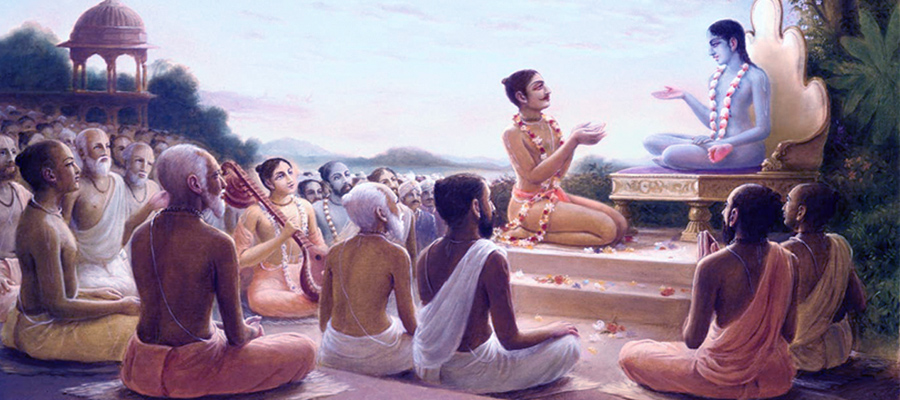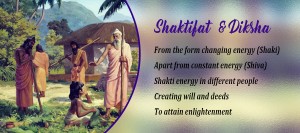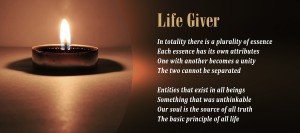Many of us may not have heard about Uddhava Gita. It is also called as the final sermons of Lord Krishna before he departed for His heavenly abode. Krishna says that he has completed his goal during this incarnation and that he is wanted back in His place. During his final moments, Krishna gives advice to his devotee Uddhava. One can call it as an advanced version of Bhagavad Gita. Uddhava Gita also forms a part of Srimad Bhagavata. The emphasis of Uddhava Gita is more on self-realization and surrender to God. Uddhava Gita begins with a scene in Dwaraka. All the Gods headed by Indra come to Dwarka. They pray to Krishna to return back to His supreme abode. He asks the elderly persons surrounding him to leave Dwaraka on a pilgrimage. Uddhava also wants to go with Krishna. Krishna did not agree with Uddhava and here Krishna’s teachings begin. His teachings are addressed to Uddhava, it is called Uddhava Gita.
Krishna says that once he leaves the earth, the earth will suffer from evil effects of Kali Yuga or Dark Age. He further says that one has to turn his indriya or sense organs inwardly and fix his mind on Krishna. Once Krishna is identified inwardly, that person is called a realized person. Krishna emphasizes the importance of realization that can be obtained through the teachings of a perfect Guru. He goes further in differentiating a man and a yogi and says that yogi eats to live and an ordinary man lives to eat. He compares a yogi with that of the ether or Akasha which remains unaffected by the effects of the other four elements. He also says that a yogi can remove the sins committed by an ordinary person, if that person is a genuine seeker of God. He says that a family man with uncontrolled senses ultimately gets only grief. He goes on describing the qualities of a yogi and says that men should not save for future. Unless the food is controlled, sense organs cannot be controlled says, Krishna. He says that a child and a self-realized person alone enjoy the Supreme bliss. He describes His Godly form as the Supreme Lord, a mass of transcendent knowledge and bliss, the Absolute and without attributes. He says that one’s own body is the best teacher. For the sustenance of the body alone, sense organs are used. After many births, one gets a human body. One should utilize this opportunity of getting a human form and aim at liberation.
Krishna says that Maya is the product of gunas (satwa, rajas, and tamas), that prevents knowing the Brahman or Atman. One stays in heaven till the result of his good deeds is exhausted. He again takes birth and the cycle goes on. He further says that knowledge and ignorance are His powers. One can any one of these from Him. Knowledge leads to liberation and ignorance of rebirths. He also prohibits the usage of “I” and “my”. He proceeds to teach the ways and means for detachment. The gopikas realized the Brahman due to their holy association with Him, thus emphasizing one’s association. He then proceeds to describe the Kundalini Shakthi and the powers derived from such practice. In the superior form spirituality, satwa guna destroys the other two gunas viz. rajas and tamas and paves way for realization. Krishna says that mind and senses can lead to a wrong interpretation of Brahman. He then talks about the three stages viz. awake, dream and deep sleep. He explains how the sense organs are gradually withdrawn from the awake stage to the deep sleep stage. By destroying one’s ego and doubts about Brahman if one concentrates on Krishna, he will be liberated.
Formation of Universe
Krishna says that Vedas are his words, which was first revealed to Brahma. Brahma taught Vedas to others. He further adds different people give different interpretations to Vedas depending upon their mindset and culture. He says that those who are attached to senses cannot enjoy His bliss. There may be his devotees who are not capable of overcoming their senses. Krishna says that He will destroy the sins of these devotees, just because of their devotion. He describes such devotees as those crying, who could not speak continuously due to overflowing emotion, dancing, weeping, shouting etc. Krishna is particularly averse about keeping company with women. He prescribes pranayama and chanting of OM.
Krishna says that He is the form of all living beings and that He is responsible for their birth, survival, and death. Then He describes himself in various forms, a true depiction of Brahman. As a matter of we cannot find any comparison anywhere when He says that He is the best amongst various categories. He says that He can count the atoms and not his various manifestations. Krishna then goes on to compare the two out of the four yugas viz. Krita yuga and Treta yuga. When a man goes to the forest for penance, he should make arrangements for the safety of his wife and children. In case his wife wishes to accompany her him to forest, he can take her too. Krishna prohibiting various activities like bathing, brushing, shaving, etc. says that man should perform Havana with the aid of fire and other available grains in the forest. He then discloses various austerity measures one has to adapt and think only about Him. The realization means not theoretical knowledge but the actual experience.
Krishna also says that a sage enjoys Him through the knowledge thus obtained. He, again and again, points out that one has to control his sense organs and should not become a victim of Maya. He also says that He is responsible for Maya too. Anything connected with the three Gunas is subject to birth, sustenance, and death. Lord then proceeds to point out 12 virtues that give liberation or material gains as per one’s requirements. The highest charity says Krishna is giving up cruelty to living beings and giving up one’s desires. Except for knowledge, dedication, and faith nothing else can liberate a man. The human body is difficult to get. By realizing this fact one must put in all-out efforts to attain liberation says, Krishna. He attaches importance to bhakti and says it is the easiest way to reach Him. Ceremonies, austerities, charity, and such other acts only strengthen one’s attachment to Him.
Krishna prefers mantras to Vedas. Not performing the ceremonies as prescribed in Vedas will be misunderstood by those, who have not crossed the initial stages. Vedas ultimately teach about Brahman within. One has to cross the initial stages by performing rituals and associated things prescribed by Vedas to reach the final stage. But mantras do not prescribe any rituals except regular chanting. This is the reason for Krishna’s preference to mantras. Krishna says that he alone knows the reasoning for the rituals prescribed by the Vedas. He clarifies that Prakriti (the source of objectivity) is the embodiment of the three gunas in equal proportion leading to birth, maintenance and death. Please note that we have already discussed prakrti as vimarsha form, the form of Shakthi. When prakrti (vimarsha) combines with Purusha (prakasha) the universe (prakasha vimarsha maha Maya swarupini) is formed says, Krishna.





